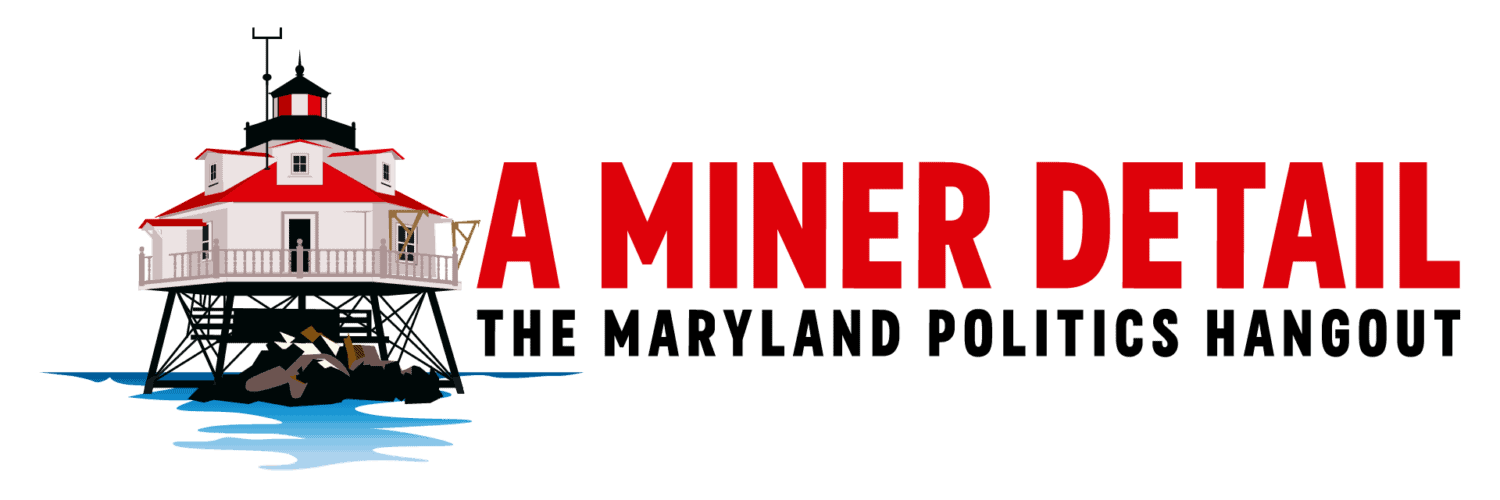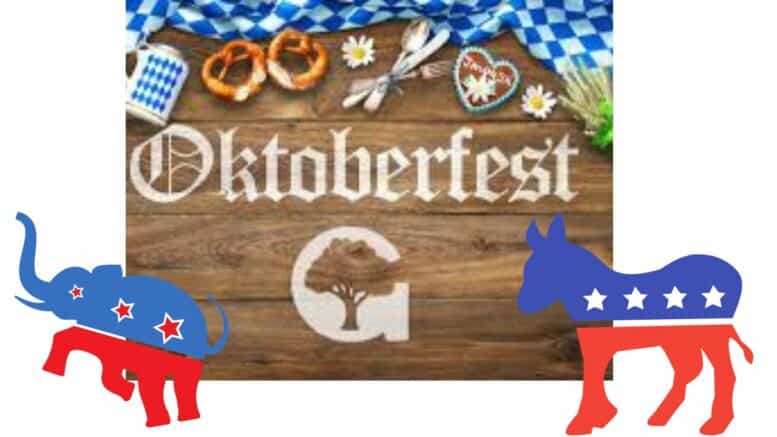Not even the promise of bratwurst (I don’t eat it) and beer (I don’t drink beer anymore) can mend the partisan divide in America.
This Sunday, Oct. 13, my wife Kim and I ventured out to the 31st annual Oktoberfest in Gaithersburg’s Kentlands neighborhood, ready for some fall festivities. Lucky for us, we can walk to the Kentlands from our house.
Little did Kim and I know we’d be stepping into a political minefield that would make the Cold War look like a friendly game of patty-cake.
In Joe Biden’s words, “Look, here’s the deal:” I’ve been around the political block a time or two.
As a moderate technocrat, a Maryland unaffiliated voter, and someone who occasionally writes about politics for fun, I’ve always prided myself on calling it like I see it, free from the shackles of party loyalty. (I was once a registered Republican and attended Maryland Republican events but changed my voter registration to Unaffiliated in April 2017 after Donald Trump was elected president.)
But that doesn’t even matter; nobody cares or should ever care how we’re registered to vote.
Today, in Gaithersburg, I wondered if I’d stumbled into some bizarro world where wearing a campaign sticker was akin to painting a target on your lederhosen.
Picture this: a beautiful 81-degree October day. The air filled with the scent of sauerkraut and the sound of polka. Kim and I, feeling particularly festive, decided to don our “Hogan for Maryland” stickers on our shirts in support of former Maryland Governor Larry Hogan’s U.S. Senate bid.
We even had the pleasure of exchanging pleasantries today with Larry Hogan himself. It’s always great to see our former governor. After chatting with Gov. Hogan, Kim and I planned for a normal day at Oktoberfest.
Oh, how naive we were. Then, the partisan circus commenced.
The first thing that intrigued us was when a polite and well-meaning volunteer for April McClain Delaney’s congressional campaign approached us, clipboard in hand. When his eyes landed on our Hogan stickers, you’d have thought we were dressed like pirates with scurvy. The poor fella nearly tripped over his assumptions, immediately writing us off as lost causes.
The nice man looked at Kim and me and said, “Oh, um, you’re probably not interested in volunteering for April.”
But we are interested. We want April McClain Delaney to win November’s general election against Neil Parrott by 50 points. And we know it’s a tight race. They need some volunteers to make that happen.
Now, here’s where it gets interesting.
Kim and I have an April McClain Delaney sign proudly displayed in our front yard. We’ve supported her since she threw her hat in the ring last fall. But apparently, in today’s political climate, supporting candidates from different parties is akin to liking both cats and dogs.
Scandalous, I know.
We gently suggested to the clipboard-wielding Delaney volunteer that perhaps judging books by their covers (or voters by their stickers) wasn’t the best campaign strategy. He apologized profusely several times and genuinely felt bad about the exchange.
It’s all good. We appreciate this volunteer supporting his candidate and signing up volunteers to help Mrs. McClain Delaney’s congressional campaign in the final weeks. She’s a great candidate with decades of experience that she can put to good use for Maryland’s 6th Congressional District.
After that exchange, Kim and I continued our walk around the Kentlands and eventually found our way to the large open space in the back. A German band played there, and a dozen or so festive food choices were available.
As we walked down a slight hill towards the Kentlands Art Barn, an Alsobrooks volunteer stood post and handed out Alsobrooks’ lime green campaign stickers to festive goers. The Alsobrooks volunteer felt compelled to grace us with an eye roll so dramatic it could have won an Oscar.
“Well, at least you’re voting,” she said, her tone dripping with condescension. We smiled and said, “Hey, thanks for being out here!”
Little did she know Kim and I hadn’t missed an election since we became eligible to vote. We’re like the Cal Ripken Jr.s of the voting world. We show up, do our part, and never miss an opportunity to partake in a sacred American tradition (kind of like baseball).
Okay, now, hold on to your trachtenhuts! The pièce de résistance came when we walked by the Democratic and Republican tents.
An older gentleman wearing an Alsobrooks sticker approached Kim and me while we stood in front of April McClain Delaney’s tent, inspecting us as closely as a TSA agent on a power trip. If that guy had an enema, we might not have been able to walk for a few days.
“You are the problem,” he declared, staring at us intently – as if he’d just solved the great mystery of America’s decline.
“I cannot believe you would vote for Larry Hogan. What’s wrong with you?” the man asked incredulously.
I couldn’t help but smile.
Paraphrasing here, I said, “I’m having a difficult time believing someone could so simply and quickly sum up a person’s entire character based on a political sticker.” The man walked away, looking as if I’d just told him the Earth was flat and made of cheese.
Now, what happened next was truly disappointing.
A few moments later, a young man, fueled by what I can only assume was a potent mixture of partisan fervor and perhaps a bit too much Oktoberfest cheer, decided to make his grand political statement. He grabbed an Alsobrooks sticker, slammed it onto a Hogan sign near the Republican tent, and then, in a display of eloquence, looked at my wife, Kim, and yelled, “F*** You!”
That wasn’t nice.
I couldn’t abide the insult against my wife, who was minding her business at a family-friendly public event.
I felt compelled to say something. However, much talk therapy and emotional growth over the years helped me approach the man with conviction, sincerity, and kindness. I didn’t even raise my voice. My voice tends to carry sometimes; it’s easily recognizable.
When I approached the man to suggest that perhaps shouting obscenities at strangers, especially women, wasn’t the best way to win hearts and minds, he wasn’t receptive; he seemed ready to turn our little Oktoberfest into WrestleMania. That Stone Cold Steve Austin shirt doesn’t even fit anymore from seventh grade.
The guy kept inching closer and closer to me. I asked him to apologize to Kim, but he refused and told me to “F*** off.”
As they say, discretion is the better part of valor, so I decided to de-escalate the situation and walk away. That was the best decision I could make. The man continued his business, and Kim and I walked away and enjoyed the rest of the festival.
Though as we walked about the Kentlands neighborhood, some of the looks we received could have curdled milk.
We presume the combination of our Larry Hogan stickers and April McClain-Delaney buttons seemed to short-circuit people’s brains. It was as if we’d showed up wearing both Yankees and Red Sox gear simultaneously. (I wouldn’t be caught dead wearing a Yankees hat; I’m a lifelong Red Sox fan.)
So, what’s the takeaway from this 2024 Oktoberfest adventure in partisan lunacy?
First, it seems we’ve reached a point where political affiliations are treated with the same tribalism as sports teams. But here’s the thing: unlike sports, in politics, we’re all supposed to be on the same team—Team America.
Second, the assumption that a single campaign sticker can sum up someone’s entire worldview is not just reductive; it’s downright dangerous. This kind of thinking is tearing at the fabric of our society and is unhealthy for our democracy.
Lastly, and perhaps most importantly, we need to remember that our neighbors, friends, and yes, even those random people we meet at Oktoberfest are more than their political affiliations. They’re complex human beings with hopes and dreams that are so much bigger than who they voted for in the last election or who they intend to vote for in the upcoming one.
At the 2024 Democratic National Convention, former President Barack Obama spoke about this in a way that no one else can.
Here’s what Obama said:
“That sense of mutual respect has to be part of our message. Our politics have become so polarized these days that all of us across the political spectrum seem so quick to assume the worst in others unless they agree with us on every single issue. We start thinking that the only way to win is to scold and shame and out-yell the other side.
And after a while, regular folks just tune out, or they don’t bother to vote.
Now that approach may work for the politicians who just want attention and thrive on division – but it won’t work for us. To make progress on the things we care about, the things that really affect people’s lives, we need to remember that we’ve all got our blind spots and contradictions and prejudices. And that if we want to win over those who aren’t yet ready to support our candidates, we need to listen to their concerns and maybe learn something in the process.
After all, if a parent or grandparent occasionally says something that makes us cringe, we don’t automatically assume they’re bad people. We recognize that the world is moving fast, that they need time and maybe a little encouragement to catch up. Our fellow citizens deserve the same grace we hope they’ll extend to us. That’s how we can build a true Democratic majority, one that can get things done.”
So, my fellow Americans, I implore you: the next time you see someone wearing a campaign sticker you don’t agree with, resist the urge to roll your eyes, shout obscenities, or assume the worst.
Instead, maybe strike up a conversation. You might be surprised to find that you have more in common than you think.
We’re so much bigger than our political parties. People are people. We can’t let our partisan differences define who we talk to and, more importantly, how we talk to people.





